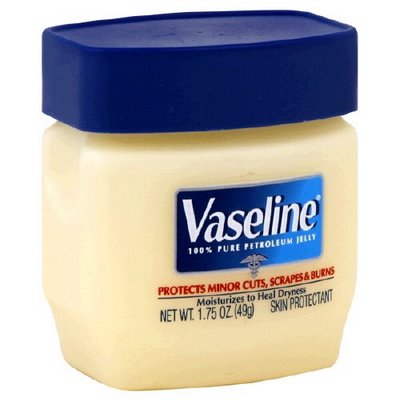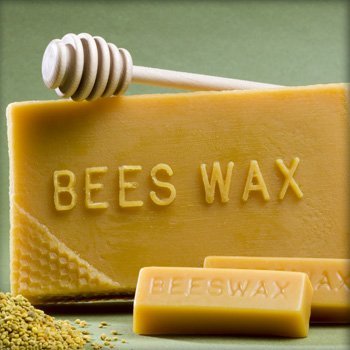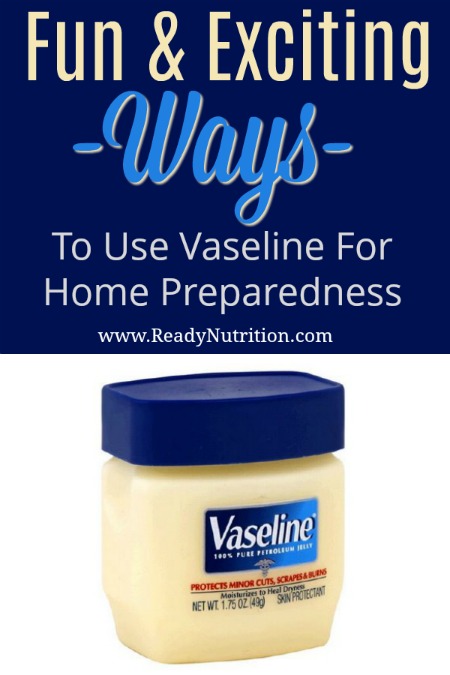
Vaseline is often found in medicine cabinets across the United States. But have you ever thought of adding some to your prepping gear? It actually can be useful in a survival situation and offers many benefits to those who store extra for when the “SHTF.” And if you’re a more natural prepper, we’ve got a few alternatives to Vaseline for you that are just as good, if not better!
What is Vaseline?
Petroleum jelly is the generic name of Vaseline. It is a lubricant and is a byproduct of the petroleum industry. Surprisingly, Vaseline is an organic product. It was originally discovered on the bottom of oil rigs and is often used to prevent or heal dry flaky skin. Vaseline is highly-refined, triple-purified, and regarded as non-carcinogenic. Other brands may not be as pure, and many dermatologists suggest sticking with the original name brand to avoid possible contamination of cancer-causing chemicals.
Vaseline is water-repellant and not water-soluble. That means it will seal the barrier so that moisture does not leave the skin. If you’ve ever had such dry skin that it’s cracked and bled, you know that feeling of instant gratification when you slather on an antiseptic that’s also a moisture barrier such as Neosporin (which contains three antibiotic ingredients in a petroleum jelly base.) Even though it’s considered safe to use, if you can access other options for your dry skin concerns, it is recommended to do so. Products containing beeswax, coconut oil, olive oil, shea butter, and/or cocoa butter seal in moisture as well are definitely more natural if that’s a concern.
Prepping Uses Of Vaseline
Vaseline is an accelerant that can be used to assist in starting a fire. Vaseline (or any generic equivalent petroleum jelly, since it won’t be used on the skin) is an ideal fuel when combined with cotton balls as a fire starter. According to the Happy Prepper, Boy Scouts and Girl Scouts have long packed cotton balls doused in Vaseline into little plastic zip bags before camping. The combination of cotton and petroleum jelly acts as tinder. Each ball will burn for about ten minutes making this option a great one to help ignite those hard to light fires! But not only that, because Vaseline is excellent at starting fires, you can make candles out of it for a little light.
Vaseline is also an effective lubricant that will prevent rust. It can be used to lubricate bike chains and garden tools and can provide the proper friction for skateboard wheels. But it can also be used to grease keyholes to help make sure locks and keys work smoothly. It can help prevent battery corrosion and ensure your zippers will slide smoothly – imagine for a moment that your bug-out bag’s zipper has gotten stuck! Just a dab of Vaseline could loosen up and help it glide better.
Vaseline does have medicinal uses too. It helps stitches heal by providing that moisture barrier discussed earlier, and can protect exposed skin from wind burn. And it really does work to soothe the discomfort of incredibly dry skin. In fact, soldiers use Vaseline Gauze to help treat wounds in the field. (Vaseline Gauze could also be used as firestarter too!)
*NEVER Appy Vaseline on the inside of the nose!
If you have no alternative, Vaseline has infinite cosmetic value, so in a SHTF situation, it’s important to note. It can be used as a lip balm to moisturize the lips and offer a soothing sensation to skin that is dry and flakey, even cracked, after being exposed to the elements for an extended amount of time. It can be used to help heal dry and cracked feet and creates a seal against harmful bacteria for minor cuts and scrapes.
22 Prepper and Homesteading Uses for Vaseline
Alternative To Vaseline
Although you may not find a better firestarter for the price, there are more natural alternatives that can be used on the face or the body. Coconut oil is one such option. Coconut oil is a staple in many vegan households, and I personally use it as an all natural makeup remover since I’m allergic to makeup wipes (and I cannot tolerate foundation on my face) but still like mascara. To remove the mascara, I scoop some coconut oil out of a jar and dab some on my eyes (it doesn’t hurt if you get it in the eyes, but this should be avoided if possible either way) and carefully wipe it away with a damp machine-washable organic cloth. Plus, if I ever get an allergic reaction on my face, and I have, I use a combination of coconut oil and organic vitamin E oil to soothe the irritation, heal the rashes, and reduce the overall redness. Obviously, this would be much less necessary in a survival situation, but coconut oil is also incredibly great at healing and soothing dry skin and preventing and treating windburn and could take the place of Vaseline for your cosmetic needs. Plus it smells great!
 Beeswax is also another alternative to Vaseline or other petroleum jelly products that more natural preppers should consider. Beeswax firestarters are actually a thing, and even though Vaseline might be slightly more effective, beeswax is still a viable option. You can buy beeswax firestarters here, or learn to make your own! Beeswax can also be used as a lip balm, made into lotions, and applied as a skin protectant. It has also been shown to offer pain relieving benefits as well, making it an excellent alternative to Vaseline.
Beeswax is also another alternative to Vaseline or other petroleum jelly products that more natural preppers should consider. Beeswax firestarters are actually a thing, and even though Vaseline might be slightly more effective, beeswax is still a viable option. You can buy beeswax firestarters here, or learn to make your own! Beeswax can also be used as a lip balm, made into lotions, and applied as a skin protectant. It has also been shown to offer pain relieving benefits as well, making it an excellent alternative to Vaseline.
Since I mentioned vitamin E oil, let’s cover it as well! Vitamin E oil is obtained by the vacuum distillation of vegetable fats. If it’s organic, it is also from non-GMO sources. It’s often diluted in a carrier oil to prevent an allergic reaction. Although some still claim vitamin E oil’s reviews are mixed, the potential benefits are derived from two key features: its antioxidant properties, which could fight inflammation and slow the effects of free radicals, and its moisturizing properties.
So if you have some Vaseline lying around and are looking for more natural options for your face and body, there are plenty. But don’t toss it out! Make candles or use it as a firestarter to prevent from wasting a product you’ve already purchased. Hopefully, this Vaseline article will help you find alternatives if that’s what you seek, and show you a few survivalist ways to use up that old jar of petroleum jelly!

This article was originally published at Ready Nutrition™ on September 28th, 2018






